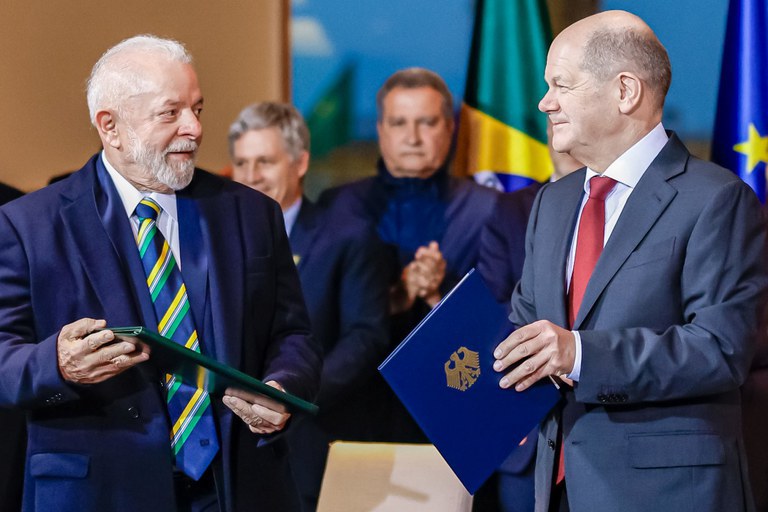Notícias
FOREIGN AFFAIRS
Lula and Olaf Scholz defend ecological transition while also promoting social justice

Topics such as green industrialization, low-carbon agriculture, the bioeconomy and zero deforestation by 2030 are part of the joint declaration of intent between Brazil and Germany - Credit: Ricardo Stuckert/PR
President Luiz Inácio Lula da Silva and German Chancellor Olaf Scholz signed a joint declaration of intent on Monday (4/12) in Berlin to carry out projects aimed, among other things, at a socially just ecological transformation, with projects that generate jobs and income in Brazil and expand cooperation windows between entrepreneurs from both countries.
Germany is Brazil's most traditional partner in terms of technical and financial cooperation. The 60-year partnership between the German Development Bank and the BNDES will be further strengthened"
Luiz Inácio Lula da Silva, President of Brazil
After taking part in the 2nd High-Level Intergovernmental Consultation Meeting between the German and Brazilian governments, the two leaders made a joint statement to the press in which they confirmed their alignment on various issues.
These include the promotion of green industrialization, low carbon agriculture, the bioeconomy and the goal of zero deforestation by 2030.
» High-resolution images (Flickr)
Scholz began his speech to journalists by emphasizing the partnership between the two countries around sustainability and praised the Brazilian president's direct commitment to environmental preservation. "Under his guidance, forest protection has once again become a priority," he said.
He also argued that the process of ecological transition should result in job creation in Brazil, with greater processing of raw materials by Brazilian industry.
ENVIRONMENT - The Brazilian president stated that the agreements in the environmental area reinforce a strong partnership between the countries, which includes the Amazon Fund and other projects. He explained to the Chancellor the measures Brazil is taking to halt deforestation and combat environmental crimes and said that this year alone deforestation in the Amazon has already fallen by almost 50%.
According to Lula, the agreement signed today is "really good for Brazil, Germany, the environmental issue and the energy transition that we are seriously addressing in Brazil".
INFORMATION - The two leaders mentioned negotiations on measures to strengthen democracy and the rule of law. "We agreed to work together to confront anti-democratic forces that act in a coordinated manner internationally and foment extremism. This is the spirit of the joint declaration on information integrity and combating disinformation," said Lula.
He also listed deals in the areas of health, science, technology and innovation, as well as those linked to agriculture, energy, the bioeconomy, the environment and climate change. "Germany is Brazil's most traditional partner in terms of technical and financial cooperation. The 60-year partnership between the German Development Bank and the BNDES will be further strengthened," he said.
In a context of geopolitical fragmentation, regional rapprochement is critical to constructing a multipolar world and strengthening multilateralism. I am a firm believer who never gives up. I am not going to give up until I have spoken with every president and received a negative response"
Luiz Inácio Lula da Silva, on the agreement between the European Union and Mercosur
G20 PRESIDENCY - On his first trip to a G20 country since taking over the presidency of the bloc, Lula reaffirmed the Brazilian administration priorities of combating inequality, hunger, poverty and climate change, as well as campaigning for a reform of global governance structures.
He defended new members of the UN Security Council once more, saying that the body created after the war in 1945 needs to reflect today's geopolitical reality and enforce decisions taken as a group, especially environmental ones. The German Chancellor agreed with Brazil's position on the UN.
MERCOSUR - EUROPEAN UNION - The two leaders were also aligned on other issues, such as the search for world peace, a peaceful solution in the Middle East, the creation of a Palestinian state and the conclusion of the European Union-Mercosur agreement.
"In a context of geopolitical fragmentation, rapprochement between the regions is central to building a multipolar world and strengthening multilateralism," said Lula.
The Brazilian president said that he would continue to work for the agreement between the blocs to take place, if possible, during Brazil's pro tempore presidency, at the summit of the South American bloc scheduled for this week in Rio de Janeiro.
"I'm a firm believer. I am a man who never gives up. You remember the slogan from my first term. I am Brazilian and I never give up. I am not going to give up until I have talked to all the presidents and received a no from everyone," he said.